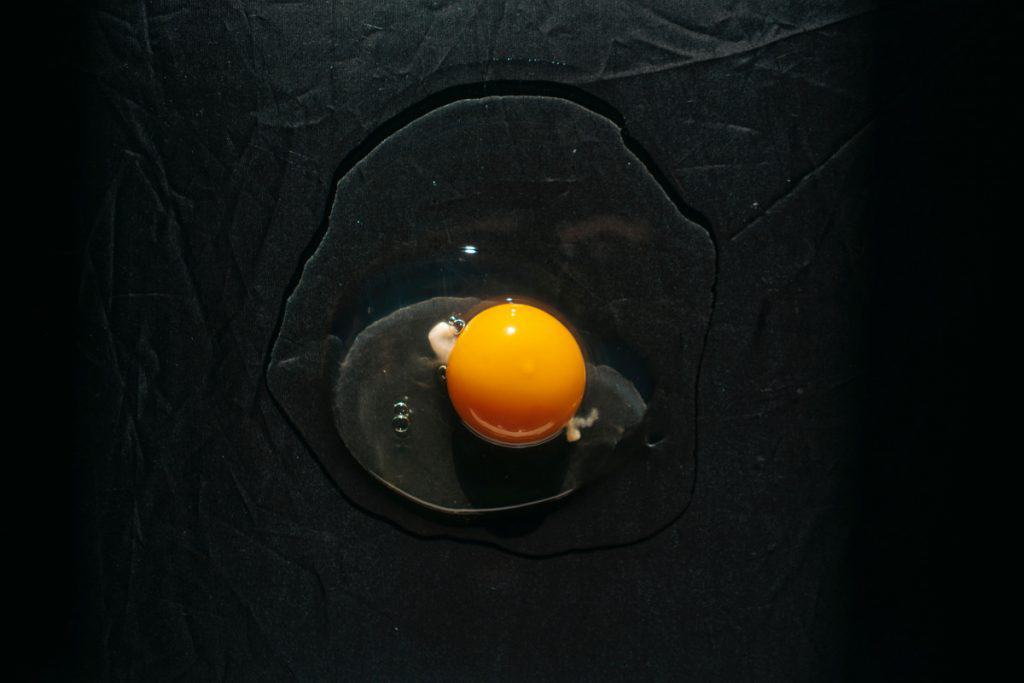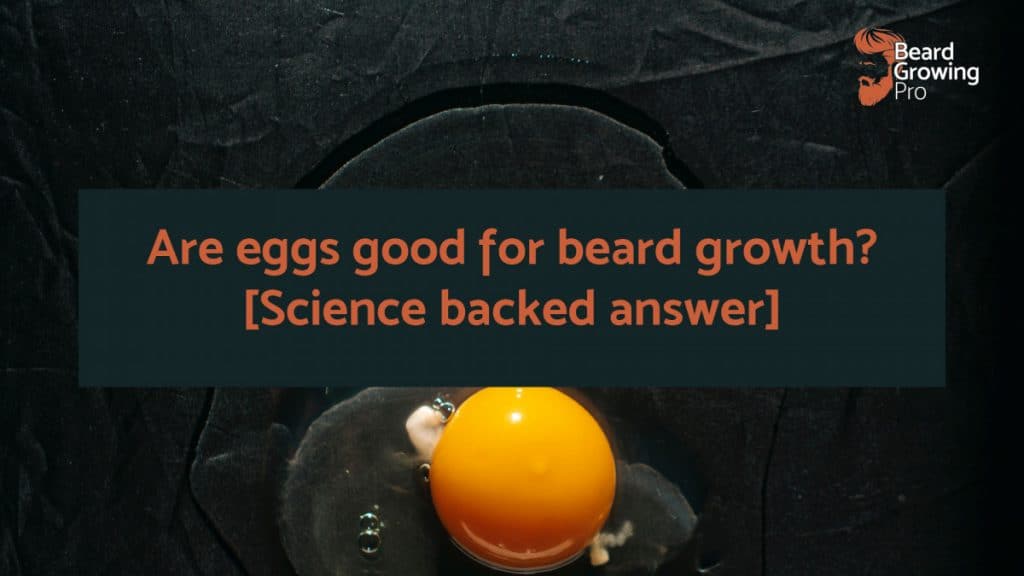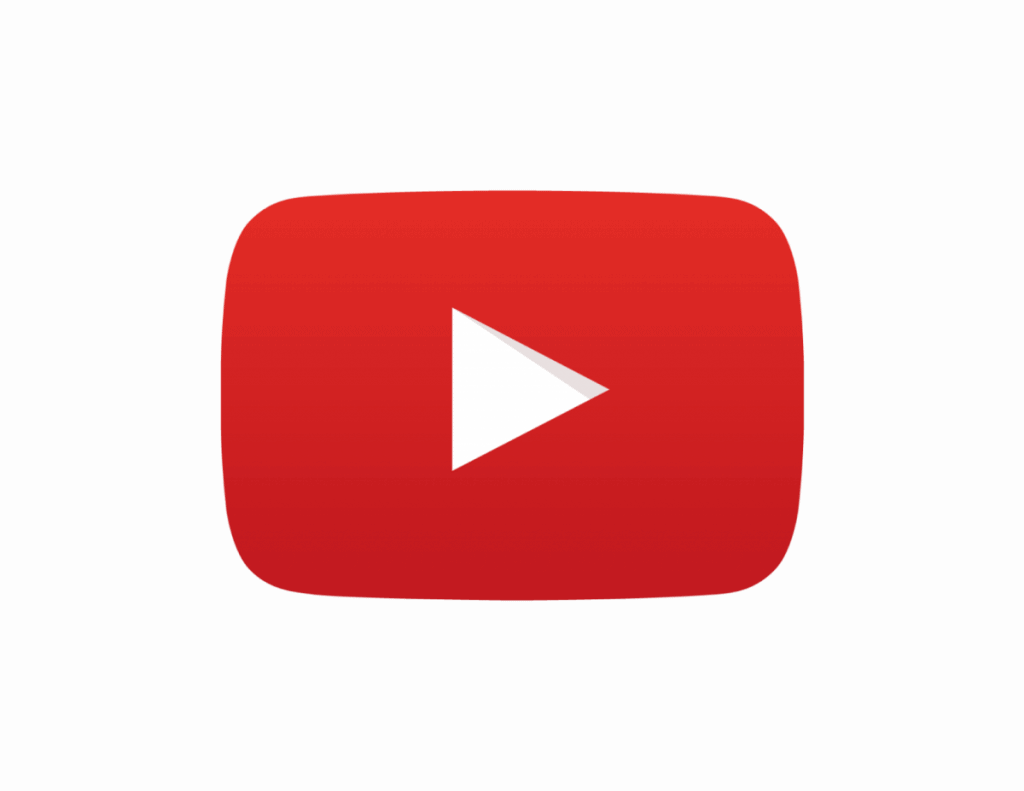Eating the right things is a foundational step in growing a strong beard. Putting the right things into your body helps in numerous ways. Including a wide variety of essential nutrients and minerals by consuming fresh produce helps boost your metabolism, helps your body create testosterone, and some nutrients provide a boost to your beard growing potential.
Eggs are good for beard growth in a variety of ways. They provide essential nutrients such as biotin, vitamin D, fatty acids, and zinc for your body to produce testosterone and DHT. There is also some evidence to suggest that egg oil provides several beneficial effects to a beard.
To truly understand exactly why eggs are good for beard growth, we must first understand what is inside an egg and all of the essential nutrients that it provides.
Article Contents
What is in an egg?
It can be relatively deceiving when you look at an egg – the internal structure is quite complicated. An egg is a source of macro and micronutrients that meet all of the requirements to support the embryonic development and hatching of a chicken. The perfect balance and diversity of nutrients and its high digestibility and low price mean the egg has become a basic food staple for humans.
![Are eggs good for beard growth? [Science backed answer].](https://beardgrowingpro.com/wp-content/uploads/2021/10/whats-in-an-egg-1024x683.jpg)
The most important aspects of a beard are found in egg yolk and white.
The egg yolk is an extremely vitamin D rich food that contains all vitamins except for vitamin C. The egg yolk contains a high amount of:
- vitamin A
- vitamin D
- vitamin E
- vitamin K
- vitamin B1
- vitamin B2
- vitamin B5
- vitamin B6
- vitamin B9
- vitamin B12
The egg white contains high amounts of vitamin B two, B3, and B5 and eating two eggs per day covers 10 to 30% of the vitamin E requirement for humans.
Eggs contain a rich collection of essential trace elements such as phosphorus, calcium, potassium, and moderate amounts of sodium. It also contains copper, iron, magnesium, manganese, selenium, and zinc. Egg yolk is the major contributor to the iron and zinc concentration, and the concentration of these trace elements are significantly increased depending on the hen’s diet.
Of all of the important minerals and vitamins found in eggs, the most important for beard growth are highlighted below.
The important vitamins and minerals
Biotin (Vitamin B7)
Biotin, also known as vitamin B7, plays a very important role in your body. It helps you to break down protein, carbohydrates, and fats. Biotin also plays a very important role in the production of keratin. Keratin is the protein that your beard is made from.
It is commonly recommended for brittle hair and other conditions but taking more than what is consumed naturally has not been shown to have any benefit. In other words, you don’t need biotin supplements unless you have been diagnosed with low levels.
Biotin is also found in nuts, seeds, bananas, and red meat. The recommended daily intake for biotin is 30 MCG.
Vitamin D
In 2007, a study looked into the role of vitamin D in hair follicle biology. This study isn’t specifically to do with the beard, but it may indicate how to create healthy hair regardless of where it is on the body – and that can include your beard. So that makes it important to understand.
There is a vitamin D receptor in several cells and tissues of the body, including the skin will stop vitamin D, which is a critical requirement for hairs to grow, proven by other studies in mice and humans. These studies have demonstrated that if there is a lack of vitamin D receptors, it results in alopecia.
The hair follicle retains some aspects of the hair during the hair cycle, including the upper outer root sheath and bulge. The lower part of the follicle goes through growth anagen, catagen, and telogen phases. The vitamin D receptor is in major cell populations that make up the hair follicle. The amount of vitamin D receptors in the hair follicle increases during the late growth and regression phases, so it is crucial when the beard and other hairs are in their growth phase.
Other vitamins like B-12, biotin and niacin can strengthen and help condition the hair, so you must consume a wide variety of foods that will help support the hair growth on your face.
Fatty acids
There has been increasing evidence that dietary fats may influence testicular function and the production of testosterone. A study in 2017 examined the association of fat intake with the number of hormones circulating in the body.
They looked at 209 young, healthy Spanish men between October 2010 and November 2011. The participants completed questionnaires on their lifestyle and diet and each want through a physical examination and provided a blood sample.
Monounsaturated fatty acid intake was inversely associated with the amount of free testosterone in the body. A positive association was observed between the intake of polyunsaturated fatty acids, particularly omega six polyunsaturated fatty acids, and hormone concentrations.
The data reported in this study suggests that fat intake of Omega three, Omega six, and trans fatty acids may influence testicular function in both their size and the amount of testosterone that they produce.
The number of fatty acids in your egg can also be impacted by the way that you cook the egg. The highest content of fatty acids was found in eggs cooked in a pan instead of boiling, oven, and microwave cooked eggs.
Zinc
Zinc is an element that you may remember from chemistry class! You can purchase zinc supplements, but it comes into its own when combined with vitamin B. Zinc can increase testosterone up to a point, but if you are not deficient in it, you will not see any increase from ingesting more.
In one study, zinc and vitamin B supplements increased sperm quality by 74%. Zinc also boosts testosterone in athletes and those who are deficient in zinc. That means if you are exercising a lot, you may want to consider taking zinc to help make sure you are not deficient.
In the case where your zinc levels are already at a good level, you’ll probably see increases in DHT, which isn’t a bad thing at all for your beard growing potential.
Besides eating an egg, you can also get the benefits of using eggs as a topical treatment for your beard.
Egg mask for beard growth
There is no evidence to suggest that topical application of egg on the hair or face will give rise to extra growth. However, you can use eggs for moisturising your beard without relying on commercial products.
As strange as it may sound, the yolk of an egg may be the perfect solution to your dull beard.
The white can also be used to help cleanse your beard hair. Eggs are found in nearly every home, and the effects can be seen after one treatment.

Here’s how it works:
- Crack one egg into a small bowl and beat it until it runs smooth and it is not lumpy
- Wet your beard fully
- Dip your beard in the egg yolk and use a wide-tooth comb to distribute the egg
- Let it sit in your beard hair for at least 20 minutes
- Wash your beard with shampoo and conditioner as usual – however, don’t use too high a heat as you could end up with scrambled egg in your beard!
Other egg and hair studies
There are plenty of other studies that have looked at hair growth using components of chicken eggs. In this section, I want to go through all of the most important and up-to-date research in the area.
Unfortunately, there are not many studies that directly relate to the growth of beard hair. A lot of the egg studies have focused on testosterone production and less on the effect of eggs on the production of beard hair.
Nonetheless, the articles in this section should provide you with a nice summary of the potential of using eggs for growing a beard.
In 2018 a study used a naturally occurring hair protein found in chicken egg yolks to stimulate hair growth. Minoxidil is a common drug used to stimulate hair on the head and face. Minoxidil works because it stimulates the vascular endothelial growth factor and improves the blood supply that hair follicles receive. Unfortunately, minoxidil has some long-term side effects, and the proteins found in eggs could provide a safe alternative. Because birds grow hair in the yolk and between days 14 and 15 after hatching, the researchers hypothesise that the chicken egg contained a key hair growth protein.
They demonstrated that the peptides that they extracted from the egg yolk stimulate the hair to grow. This treatment could be a viable alternative to minoxidil in the future and has yet to be trialled clinically or on the face.
What foods promote beard growth?
Besides eggs, there are plenty of other foods that can help boost your beard growth. If you want to know more about the seven foods you can eat, check out my YouTube video below.
There are also plenty of beneficial nutrients in these foods:
- Berries and citrus – vitamin C is a very strong antioxidant and can be found in berries, oranges, kiwi fruits, and strawberries. Vitamin C can protect the beard follicle against damage from free radicals in the body. Vitamin C is also used to produce collagen for your hair.
- Spinach and kale – spinach and kale contain vitamin C, and vitamin A. Item in a helps the glands in the face but you see them this is an oil produced by your face to keep the hair and the skin well-conditioned. As your beard gets longer see them will become very important in keeping it conditioned.
- Fatty fish – some types of fatty fish contain a huge amount of omega-three fatty acids. Omega-three fatty acids can promote hair growth and are found in tuna, salmon, sardines, mackerel, trout, and other fish.
- Avocados – Avocados are delicious and a wicked source of healthy fats. They contain a huge amount of vitamin E, which, like vitamin A, helps combat oxidative stress caused by free radicals in the body. One study resulted in people with hair loss seeing 34.5% more hair growth after taking Vitamin E for eight months.
- Nuts and seeds – Almonds and sunflower seeds are a delicious way to boost nutrients to your meals. Nuts and seeds contain vitamin B, vitamin A, zinc, selenium, and omega-three fatty acids.
Are eggs good for beard growth? Summary
This article has gone over everything you need to know about using eggs to support your beard growth. Eggs are an incredibly dense source of essential nutrients for your beard, and consuming two eggs a day can provide several beneficial outcomes for your health and your beard.
You can also use a beard mask to impart a natural shine to your beard. Simply whisking up an egg and applying it to your beard can make it much more well-conditioned and healthy-looking.



